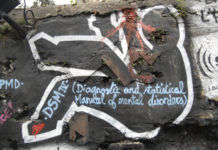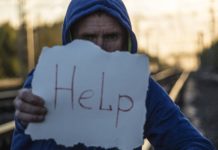Decontextualized Depression and PTSD Diagnoses Fail Indigenous Communities
A case analysis of an American Indian woman illustrates how the DSM diagnostic criteria misrepresent the lives of indigenous people.
Marci Webber Granted a Conditional Discharge
In 2010, Marci Webber killed her four-year-old daughter during a psychotic episode that erupted while she was on a cocktail of psychiatric drugs. She was found not guilty by reason of insanity. A judge has now ruled that she should be discharged from a mental hospital.
How Social Dynamics at School Impact Teen Suicide
Teen suicide risk is influenced by relationships with adults and teachers, perceived popularity, close friendships, and school connectedness.
Antidepressant-Induced Mania: When My Mind Became a Literal Hell
The amount of anxiety I felt on these medications — and for a couple of years after — was unfathomable. I felt as though I was trapped in an air-tight vat, constantly gasping for breath. And my thoughts were guided by my state of constant worry and panic.
Zoloft Does Not Improve Depression, Even in Severe Cases, Study Finds
Despite their finding, the researchers suggest that SSRIs be given to people who do not meet criteria for depression or anxiety.
Tensions in Mental Health Care in China: An Interview with Zhiying Ma
Anthropologist Zhiying Ma explores mental health care in China, including tensions between Western psychiatry and socially-oriented local frameworks.
The Problems with the DSM Mask a Dark Reality We’re All Complicit In
It would be comforting to conclude that the people in charge of such projects as the DSM are perhaps a little sociopathic or deviously immoral. Unfortunately, it is not that simple. We are all inextricably bound to, and complicit in, the problem we are attacking.
“Please Be Normal!” My Experience Working for NAMI
At my job with a NAMI affiliate, I heard daily from people who looked at family members with “mental illness” as non-people, non-human, the “other.” In the office, it was no different. If NAMI had a tagline, it would be “Please be normal like us.”
Economic Deprivation and Social Fragmentation Drive Suicide Rates in US
Major study finds that economic deprivation and a lack of social capital are driving increasing rates of suicide in the U.S.
Why I’m Glad I Did Not Complete the Mental Health Counselor Education Program
One needs no psychiatric or counseling degree to have the common sense of displaying some good manners in a profession that claims to be all about helping people. I’m glad I did not get further involved within a field that seems to be so hypocritical and moody.
How to Involve Youth in Their Own Mental Health Care
Clinicians play a key role in empowering adolescents and their parents to make decisions about their mental health treatment.
Antidepressant Use Associated With More Violent Suicide Attempts
A new study found that taking an antidepressant medication was associated with a heightened risk of suicide using violent means.
10 Reasons Why Psychiatry Lives On—Obvious, Dark, and Darkest
No matter how clearly the scientific case is made that psychiatry is a pseudoscientific institution, it continues to retain power. When we recognize that scientific truths alone are not setting society free, we begin to shift our energy to different strategies.
Antidepressant Use Does Not Prevent Suicide, Study Finds
A new study has found that antidepressants are ineffective for reducing suicide attempts. Researchers report that the risk of suicide is particularly high in the first month after starting an antidepressant.
Therapy Gets More Effective Over Time While Antidepressants Decrease in Effectiveness
New review of long-term depression data finds psychotherapy more effective over time whereas antidepressants decrease in effectiveness.
Is Remaking Psychiatric Care Possible?
The failures of our current drug-based paradigm of psychiatric care tell of a pressing need for systemic changes in psychiatry. But as we discovered when marketing our new continuing education course on this topic, it's always difficult to promote radical change.
Ben Furman – Understanding and Dealing With Adolescent Rage
A podcast interview with Finnish psychiatrist Ben Furman in which he discusses adolescent rage and how parents can come to understand and deal with teenagers and young adults who are angry and explosive.
Lingering Side Effects of Quitting Antidepressants
Nobody told me what it would be like when I first stopped taking antidepressants. The worst is definitely over, but I’m still experiencing some lingering side effects. When the hyper-arousal to sights and sounds kicks in and my head starts buzzing, I’ve learned some ways to cope.
Scaling Up Psychiatric Interventions Globally May Impede UN Goals
Peter Lehmann argues that administering psychiatric drugs in low-and-middle-income countries works at cross purposes with the United Nations Sustainable Development Goals.
Psychiatrist Describes Role in Open Dialogue Model of Care
Psychiatrist outlines varying roles in Open Dialogue model, fostering service-user and family agency through meaningful conversations with a team of providers.
Trump and Cuomo: Red Flags Are Red Herrings
Curtailing the rights of people with psychiatric histories is nothing more than a red herring, a ploy to maintain social control. We need to disarm the “re-institutionalization” movement by holding it accountable to the actual science of modern psychiatry and the history of institutions.
How Does the Soteria House Heal?
The alternative treatment model of Soteria helps individuals suffering from schizophrenia without relying on medication or coercion.
How Psychological Injuries Cause Physical Illness—And How Therapy Can Heal It
How does experiencing physical abuse as an 8 year old shorten one's lifespan? How do insulting words turn into diabetes? Or sexual abuse trigger a heart attack 50 years in the future? Emotional wounds can damage DNA and produce a huge web of destructive effects, but therapy can turn the process around.
Guidelines Recommending Antidepressants “in Contradiction with the Current Evidence”
Researchers critique the German S3 guidelines for depression promoting antidepressants.
Connectedness at School Related to Students’ Emotional Health
New research highlights differences in levels of school connectedness among students diagnosed with emotional and behavioral disorders,

































